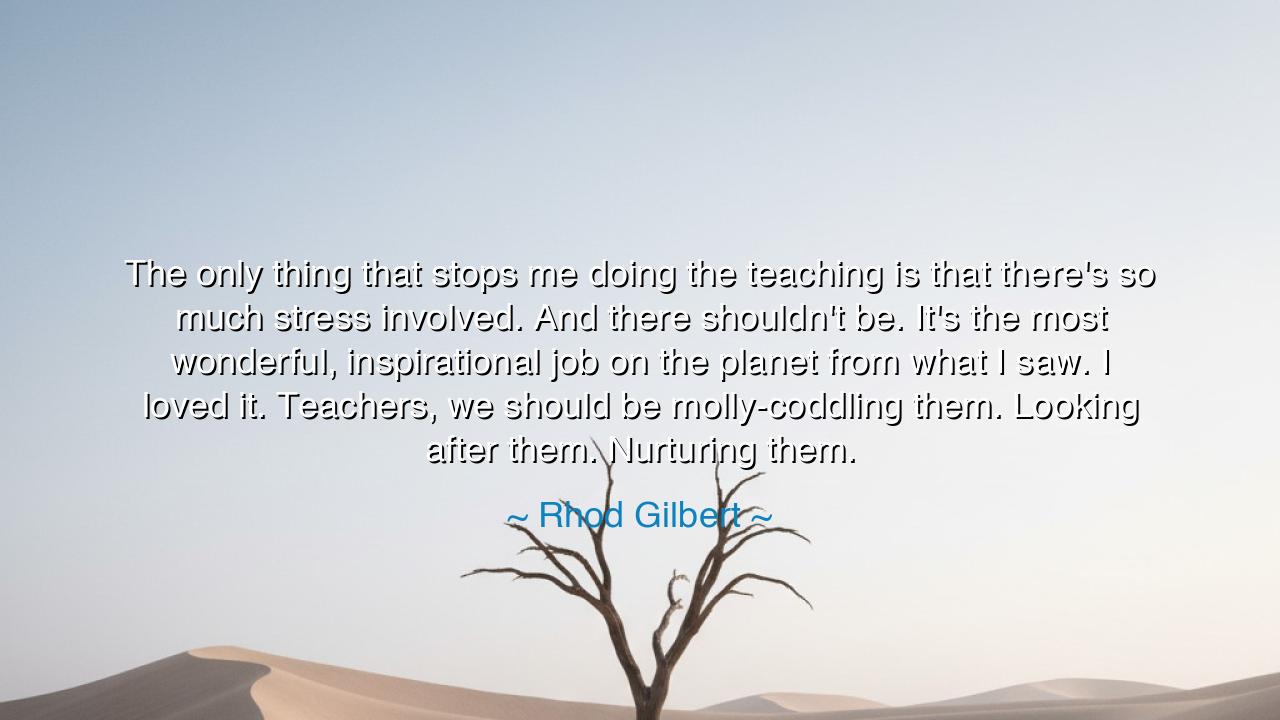
The only thing that stops me doing the teaching is that there's
The only thing that stops me doing the teaching is that there's so much stress involved. And there shouldn't be. It's the most wonderful, inspirational job on the planet from what I saw. I loved it. Teachers, we should be molly-coddling them. Looking after them. Nurturing them.






In the heartfelt words of Rhod Gilbert, the Welsh comedian whose humor often masks a deep compassion for the human struggle, we find a truth that echoes through time: “The only thing that stops me doing the teaching is that there's so much stress involved. And there shouldn't be. It's the most wonderful, inspirational job on the planet from what I saw. I loved it. Teachers, we should be molly-coddling them. Looking after them. Nurturing them.” Beneath these words lies not jest, but reverence—a cry from the soul for those who shape the minds of generations. Gilbert’s reflection speaks not merely of education, but of the sacred labor of teaching, a calling as noble as it is heavy.
The origin of this quote rests in Rhod Gilbert’s own experience stepping into the role of a teacher for a documentary project. There, amid the laughter and the chaos of the classroom, he glimpsed the beauty and burden of the profession. He saw teachers who carried the dreams of countless children upon their shoulders, who stood like pillars of light in a storm of expectation. But he also saw the cost—the exhaustion, the unending stress, the weight of systems that often forget the humanity of those within them. His words rise, therefore, as both praise and plea: praise for those who teach, and a plea that we, as a society, honor them as they deserve.
From the earliest civilizations, the teacher has stood as the bridge between ignorance and understanding, between darkness and dawn. In ancient Greece, Socrates walked the streets of Athens, guiding minds toward truth not through wealth or status, but through questions that stirred the soul. In China, Confucius taught that the strength of a nation lay not in armies, but in its teachers. And in every era since, those who have dared to teach have carried the same flame—the flame of inspiration, passed hand to hand, heart to heart, across millennia. Yet, as Rhod Gilbert laments, this sacred work has too often been burdened with stress rather than support, bureaucracy rather than gratitude.
Gilbert’s call to “molly-coddle” and “nurture” teachers may sound playful, but it carries deep wisdom. For what he truly means is that those who give so much of themselves must, too, be cared for. A teacher’s strength does not spring from mere duty, but from being valued and sustained. When a teacher is supported, the light they give can illuminate countless futures; but when they are neglected, the flame begins to flicker. The ancients understood this well—when Aristotle taught Alexander the Great, the young conqueror was told to honor his teacher as he would his father, “for one gave me life, but the other taught me how to live.”
The stress Gilbert speaks of is not only the toil of work, but the sorrow of a world that forgets its gratitude. Too many teachers labor unseen, their triumphs unsung, their sacrifices unnoticed. Yet they are the architects of civilization itself. Every scientist, every artist, every leader began in a classroom, under the patient gaze of a teacher who believed before the world did. When Gilbert says, “It’s the most wonderful, inspirational job on the planet,” he recognizes this quiet heroism—the ability to plant seeds of greatness in others while asking for nothing in return.
Let us therefore heed his words as a call to action. To honor teachers is not mere sentiment; it is duty. Support them with respect, resources, and rest. Lift their burdens where we can. Encourage the next generation not only to learn but to appreciate those who guide their learning. For to strengthen our teachers is to strengthen the very foundations of humanity. The stress that Gilbert mourns need not define the profession—it can be replaced with reverence, collaboration, and joy, if only we choose to see.
And so, dear reader, take this lesson as both remembrance and resolve: nurture those who nurture others. Whether in the classroom or beyond it, every teacher deserves to be cherished as the guardian of hope they are. For no empire, no invention, no poem, and no progress has ever existed without the patient hand of a teacher guiding its birth. Rhod Gilbert’s words remind us that teaching, though fraught with strain, remains a divine vocation—one that deserves not only our applause, but our care. Let us, then, as he urged, look after them, nurture them, and lift them up, for in their strength lies the promise of every dawn yet to come.






AAdministratorAdministrator
Welcome, honored guests. Please leave a comment, we will respond soon